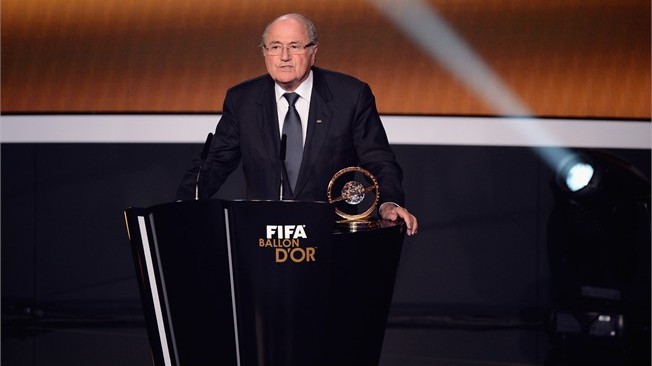By Andrew Warshaw, Chief Correspondent
January 25 – FIFA president Sepp Blatter has reiterated his stance that racist abuse should be punished by points deductions – and even relegation.
Blatter tweeted similar views last weekend but in an interview with his own organisation’s website he says the time has come for FIFA to tell its members to consider taking far stronger action.
“It is now up to us to take the adequate steps,” said Blatter. “What I feel we should do is give instructions to our national associations and the confederations – specifically to the disciplinary committees – to be very strong.”
“It is not enough to give a fine. Playing a game without spectators is one of the possible sanctions, but the best would be the deduction of points and the relegation of a team, because finally the club is responsible for their spectators.”
Earlier this month FIFA imposed for the first time a one-match spectator ban on Bulgaria for racist abuse by their fans of a Danish player. Blatter has also backed AC Milan midfielder Kevin-Prince Boateng for walking off the field during the notorious friendly against Pro Patria — though has said that mass player walk-offs are not the solution to the problem.
“We in football cannot be made responsible for what happens in our society,” said Blatter. “”But nowhere in the world – regarding all the problems you can have in your private life, in business, in politics – can you solve a problem by running away. (But) I agree with and support the movement of Boateng – as I have said – as it was a strong warning.”
Blatter suggested that as well awarding the annual Ballon d’Or to the world’s best player – won once again recently by Lionel Messi – the two other annual candidates should also have official recognition rather than simply being there to make up numbers.
“Perhaps we should give three medals to avoid two of them going home empty-handed. This is something we should think about for the future.”
And he believes women’s football made the most impact of any development within the game during 2012.
“We had two competitions in the FIFA calendar, with the U-20s and the U-17s. The U-17s was played for the first time in a Muslim country, Azerbaijan. The highlight though was definitely the Olympic Games in London. Who would have expected, and especially not me I must confess, so many spectators and such enthusiasm for women’s football? Who would have thought about this immense euphoria finally for women’s football? To have 80,000 people at Wembley, the temple of men’s football, for a match there was really something.”
On the subject of goalline technology, Blatter, who changed his mind about the concept after Frank Lampard’s disallowed goal at the 2010 World Cup, told critics that even referees now wanted some kind of foolproof scientific system to help decide whether the ball has crossed the line.
“Referees have said it is a big help for them. We now have a system, we have to use it. I took this decision at the time when I saw the 2010 FIFA World Cup, when Lampard scored a goal and everybody on television saw it but the officials could not.
“So, I said if we have adequate systems, we have to use them for the next FIFA World Cup. If we do not use them and a similar situation happened then we really would look like fools.”
Blatter re-iterated his often quoted description of match-fixing as “one of the devils of football” and repeated his optimism that FIFA’s two-year “road to reform” after a series of corruption and bribery cases was on the right track towards its conclusion at the FIFA Congress in Mauritius in May.
“Now we are in the last round and we will bring it to an end by proposing some changes to the statutes to the 2013 congress. They will speak about the duration of mandates, age limits and such items. We are consulting the national associations through the confederations, and in the March Executive Committee meeting we will have the results and see what we have to change.”
“In Mauritius I am convinced we will bring our reform programme to an end. It’s a big change. If you look at the FIFA Executive Committee, there will be a lot of changes by next May from when we took our first steps in 2011.”
Contact the writer of this story at moc.l1745533804labto1745533804ofdlr1745533804owedi1745533804sni@w1745533804ahsra1745533804w.wer1745533804dna1745533804

